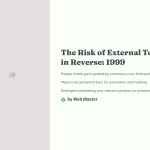 With the recent popularity of Reverse: 1999, players have been exploring various ways to enhance their experience, including using external tools. However, not all of these tools are safe or legal to use within the game’s terms of service. Let’s break down the risks, rules, and what players should know before diving into third-party utilities.
With the recent popularity of Reverse: 1999, players have been exploring various ways to enhance their experience, including using external tools. However, not all of these tools are safe or legal to use within the game’s terms of service. Let’s break down the risks, rules, and what players should know before diving into third-party utilities.

Why Players Use External Tools in Reverse: 1999
Many gamers turn to external tools for features like auto farming, reroll automation, damage calculators, and even language patches. These tools can offer convenience and a competitive edge. However, they often operate outside the scope of the game’s intended design and may access game files or servers in unauthorized ways. This leads to major ethical and security concerns.
Moreover, the developers actively monitor for suspicious behavior. Using such tools might not just risk your account but also hinder fair gameplay. The momentary benefits can’t outweigh the long-term consequences.

Types of External Tools and Their Risks
There are several categories of external tools used in Reverse: 1999:
- Auto clickers and macros: Automate repetitive tasks but can trigger anti-cheat systems.
- Modded clients: Provide unauthorized advantages, such as increased drop rates or modified visuals.
- Data miners: Extract hidden content or upcoming updates, often violating confidentiality terms.
- Scripting engines: Run actions in the background, giving unfair auto-play features.
Each of these carries varying levels of risk. Most notably, any modification or interception of game data may lead to account suspension or a permanent ban.

Official Response from Bluepoch
Bluepoch, the developers of Reverse: 1999, have issued multiple statements regarding external tools. They maintain a zero-tolerance policy for:
- Third-party software that alters the client.
- Automation tools affecting matchmaking or game progression.
- Tools that collect data via packet sniffing or memory reading.
Recent updates have included enhanced detection algorithms and periodic account audits. In early 2025, a wave of account suspensions affected thousands of players using such tools, with no option for appeal.

Legal and Ethical Implications for Players
Beyond being against the terms of service, using external tools can be considered a form of cheating, damaging the integrity of competitive gameplay. It creates an uneven playing field and can discourage legitimate users from continuing with the game.
Legally, if the tools involve data scraping or breach intellectual property, developers have the right to pursue legal action. Even if no lawsuit is filed, you could still lose access to your in-game assets, purchases, and progress without warning.

Safe Alternatives to Enhance Gameplay
Not all enhancements are unsafe. Here are some safe practices and tools:
- Official forums and Discords: Join community-led strategies and guides.
- Overlay planners: Use non-invasive tools that don’t access game memory.
- Spreadsheet trackers: Organize gacha results or farming plans.
- In-game accessibility options: Adjust controls and visuals within the client settings.
These methods help boost efficiency while keeping you within the rules and avoiding any account penalties.

Final Advice: Stay Safe, Stay Fair
To wrap things up—if you value your Reverse: 1999 account and want to enjoy the game long-term, avoid any third-party tools that could compromise your standing. Bluepoch has shown they’re serious about maintaining fair play, and being caught once could mean permanent exclusion.
Stick to community-approved strategies and optimize your gameplay legally. Your time and efforts deserve to be protected, and the best way to ensure that is by playing safe and smart.
*Capturing unauthorized images is prohibited*







